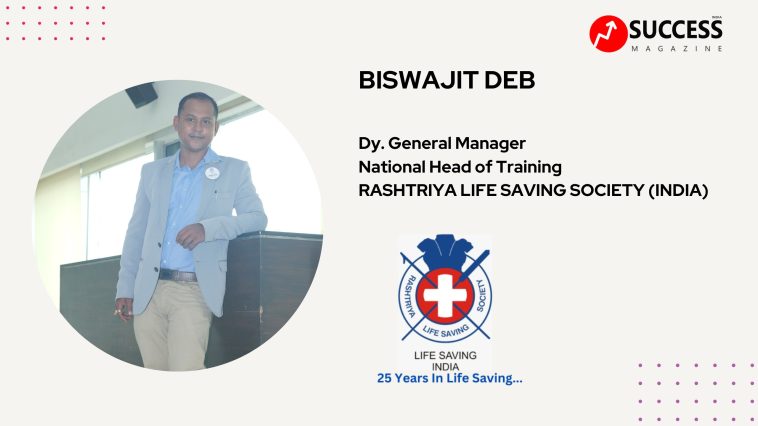Biswajit Deb, Dy. General Manager, National Head of Training, RASHTRIYA LIFE SAVING SOCIETY (INDIA)
With over 20 years of extensive experience, Biswajit Deb stands as a stalwart in the field of safety and emergency preparedness. A seasoned professional, Biswajit has not only demonstrated his prowess in the corporate training sector but also boasts remarkable achievements in long-distance swimming, having conquered both 80 km and 200 km stretches. His dedication to ensuring safety and preparedness for every client and student is captured in his tagline: “Committed to Respect, Safety, and Preparedness in Emergency for Every Client and Student.”
Projects Managed
Biswajit’s expertise has been sought after by various prestigious organizations and projects, including:
- Laureus Sports Foundation International
- Taj Group of Hotels
- MalPani Group
- ITC Hotels
- Frankfinn
- Fly High Institute
- Heritage British Club
- Royal Bombay Yacht Club Colaba
- SRF Pritampura & Industrial Metal Powders (India)
- Yachting Association of India
- College of Engineering Pune
- Mahindra World College UWC
- Wellington College International Pune
- International Institute of Sports Management Pune
- Underprivileged Program for Yardi Group
- Atma Mallik Foundation
In collaboration with government entities, Biswajit has also led projects with:
- NDRF
- Madhya Pradesh SDERF
- Rajasthan SDRF
- Andhra Pradesh SDRF
- Ayodhya Irrigation Division
- Pondicherry Tourism
- DTPC- District Tourism Promotion Councils Kerala Tourism
- Eco Retreat Kodiak Fortes Authority

Safety Training at Corporate Offices
Q: Why is first aid or lifesaving training required in the corporate field?
A: The primary goal is to create a safer workplace. If employees are trained in first aid and lifesaving skills, they can assist colleagues during emergencies, thereby protecting the company’s human resources. Additionally, these skills extend beyond the workplace, enabling employees to help family and friends, thus contributing to society at large.
Q: Are safety trainings taken seriously in corporate offices?
A: Observations indicate a varied attitude towards safety training. Top management values these trainings highly, seeing them as essential for preserving human resources and benefiting the company. Middle managers view them as necessary events that should not disrupt regular work. Meanwhile, lower-level employees often see them as additional tasks. However, there are exceptions at every level.
Q: What is the present state of safety trainings at corporate offices?
A: Safety trainings are more accepted now than in the past. Previously considered an unnecessary burden, they are now recognized as essential skills. Nonetheless, the perception often remains that these trainings are just for certification rather than practical application. Training sessions are sometimes cut short to maintain regular workflow.
Q: What is the outcome of the current state of safety trainings?
A: While participants typically pass and receive certificates, they often struggle with confidence and practical implementation of their training.
Q: What solutions can bridge the gap?
A: The focus should be on the effectiveness of the training. Organizers must not compromise on training time and should plan to maintain regular work without interrupting training sessions. Pre-training sessions to highlight the importance of the training, consideration of trainers’ suggestions, and proper assessment of participants’ understanding are crucial. An internal audit by subject experts could help evaluate the actual learning outcomes and the value of the training.
Biswajit Deb’s unwavering commitment to safety, respect, and preparedness ensures that every training session is not just an event, but a vital enhancement of skills that can make a real difference in emergencies. His leadership in the field is not only about imparting knowledge but about instilling confidence and competence in every participant.


